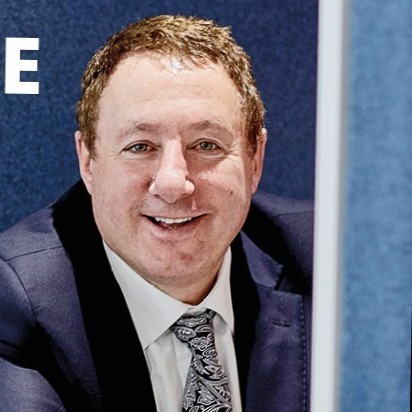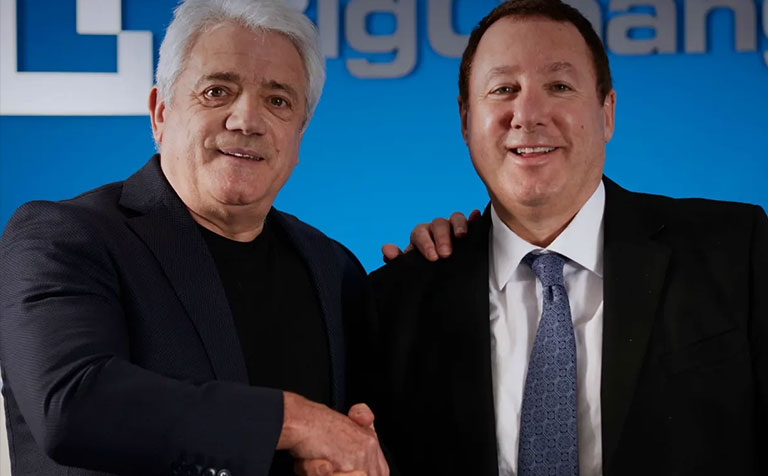Footballer Clarke Carlisle tells us ‘It’s OK to talk’ on Motivational Monday

“For 21 years, I’ve been living with depression. For 15 of those, I didn’t even know,” said former professional footballer Clarke Carlisle at the start of this month’s Motivational Monday.
Clarke is a former top-level footballer, straight-A GCSE student, defender for England Under-21s, and chairman of the Professional Footballers Association. He is also a survivor of five suicide attempts – and he has devoted his post-playing years to helping others thrive and avoid the darkness that at times enveloped him.
His story is one of transforming your life by having the courage to ask for help.
Two pieces of advice for people who think they’re suffering – or think they know someone who is – shone through.
Clarke Said:
“Do you think about your thinking? Thoughts aren’t facts, they’re intrusive, they come in, and then it’s up to you how you connect with it. And think about if you need to share it. Men aren’t great communicators, but for 15 years my actions were screaming for support, before judging someone’s behaviours, think ‘is there something this person needs help with and can I help?”
Clarke stressed the importance of talking about mental health and breaking down stigmas – drawing on his personal experience of burying your depression.
His issues in facing up to his mental health started with a stoic, disciplinarian father and a mother with a stiff upper lip,
“What goes on behind this front door stays behind this front door,”
Clarke recalls them saying.
As a member of an interracial family in 70s Britain, he was told early and often that,
“You have to be better than everyone else, to be seen as equal to everyone else.”
He took this advice to heart, leaving school as a straight-A student and landing a spot in the Blackpool first-team at 16.
A poor debut left him questioning if he was good enough, but scoring a 91st-minute winner in his first home match suggested he was.
After several successful seasons, multiple man-of-the-match awards, and a call up for the England Under-21’s, a serious injury put him out for the season and left his footballing future at risk. That’s when the depression crept in.
A lack of awareness about depression meant Clarke tackled the symptoms of his illness instead of the real issue. Even after the first of his five suicide attempts.
“My depression would manifest in crazy outbursts, binging and dangerous behaviour. At first I thought it was the drink, so I went to rehab. Afterwards, I was still staying in bed for 2-3 days, dodging work and family. I thought I was an idiot who couldn’t make responsible decisions.”
That wasn’t true. Clarke became Chair of the PFA in 2010, became the first footballer to appear on Question Time, and commentated on the 2014 World Cup Finals.
“Despite that every two or three months I was exploding into these behaviours. Anytime I felt my career was threatened, or my identity was questioned, my brain automatically connected it to that first suicide attempt. These behaviours were the uneducated mind trying to cope by oblivion and avoidance.”
Throughout his successful career, Clarke was often caught up by these dark thoughts. “It became my truth,” he said. “Because I didn’t share it with anyone it went round and round my head.”
Clarke was diagnosed with recurring, complex depressive disorder. This was the first step in understanding his illness and starting to heal. His wife Carrie joined Clarke to talk about how mental health affects the whole family, and about their shared recovery journey.
“Clarke had been in that pit of despair for 20 years,” Carrie said:
“He’d climb out occasionally but it would suck him back in because he didn’t change his behaviours, change his beliefs, and he didn’t get professional guidance.”
In 2017, Clarke went into psychiatric care. Carrie remembers how,
“it took him only 23 days, resting, eating, being diagnosed by professionals and treated properly for him to be well enough to come home”.
Understanding his illness, speaking out about his problems and finding help from the right professionals all helped Clarke’s recovery. He urged anyone who felt similar to do the same.
His message couldn’t come at a more pressing time. He said:
“Not all depression is trauma-based,” he said. “We’re only just learning about how it can be passed through genes, but it can even come about after a period of sustained stress and pressure. How long is that period? Six weeks. And we’ve spent the last 15 months in a pandemic.”
Clarke and Carrie were joined by Leon McQuade from Andy’s Man Club, a mental-health charity dedicated to getting men talking about their problems. He cited the terrible statistic that every two hours a man takes his life in the UK, but said how change is coming as more men speak up honestly about their experiences.
The charity runs 50 clubs across the UK, creating safe, attentive spaces for men to open up about their struggles. Its awareness campaign epitomises the biggest takeaway from this month’s Motivational Monday – ‘It’s OK to talk’.
Next month we’ll be joined by the TV presenter and Invictus Games medallist JJ Chalmers. Our charity partner will be Help for Heroes, of which JJ is a patron. we hope you can join us then, you can register here: http://bigchan.ge/MM-JJ-Chalmers.



